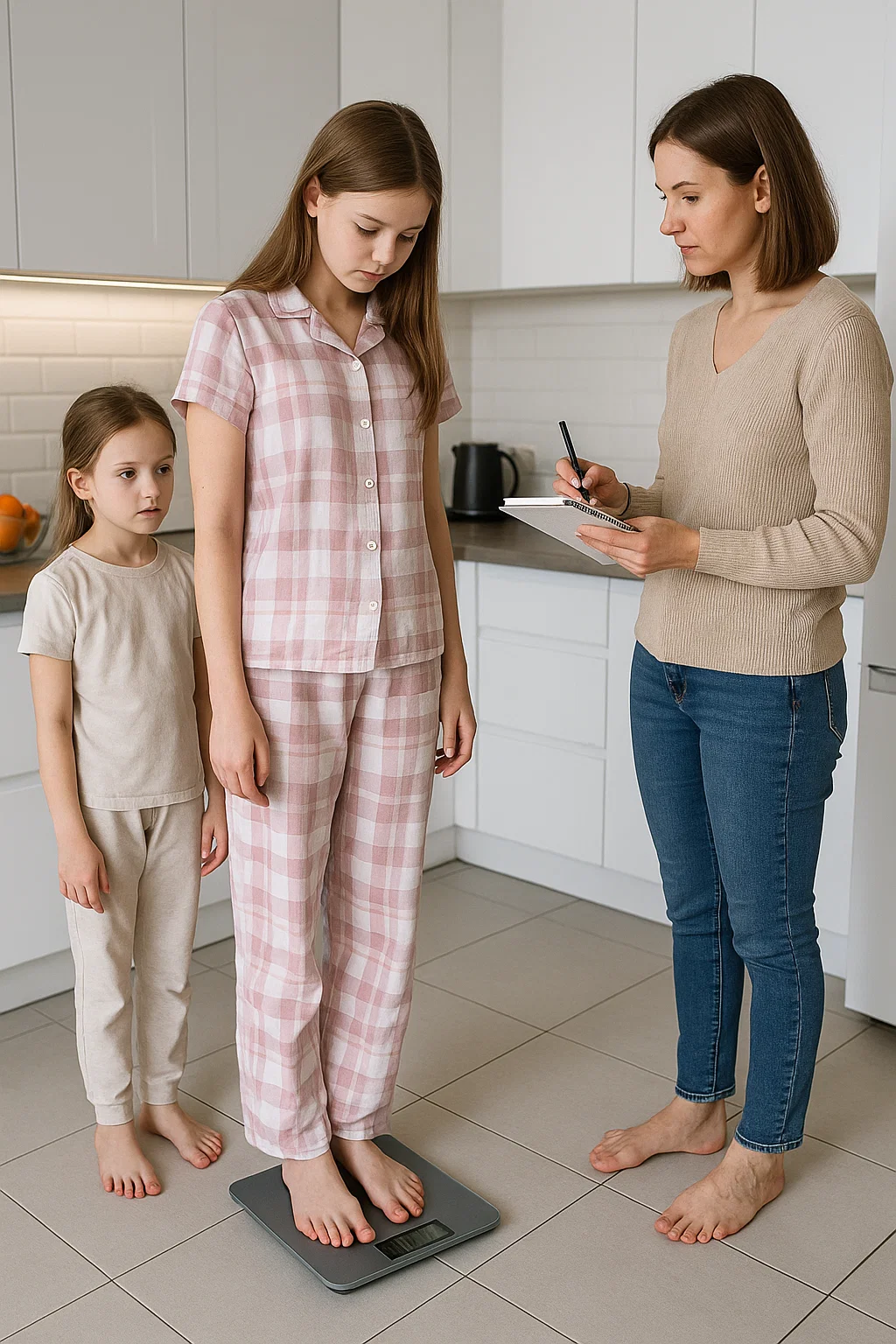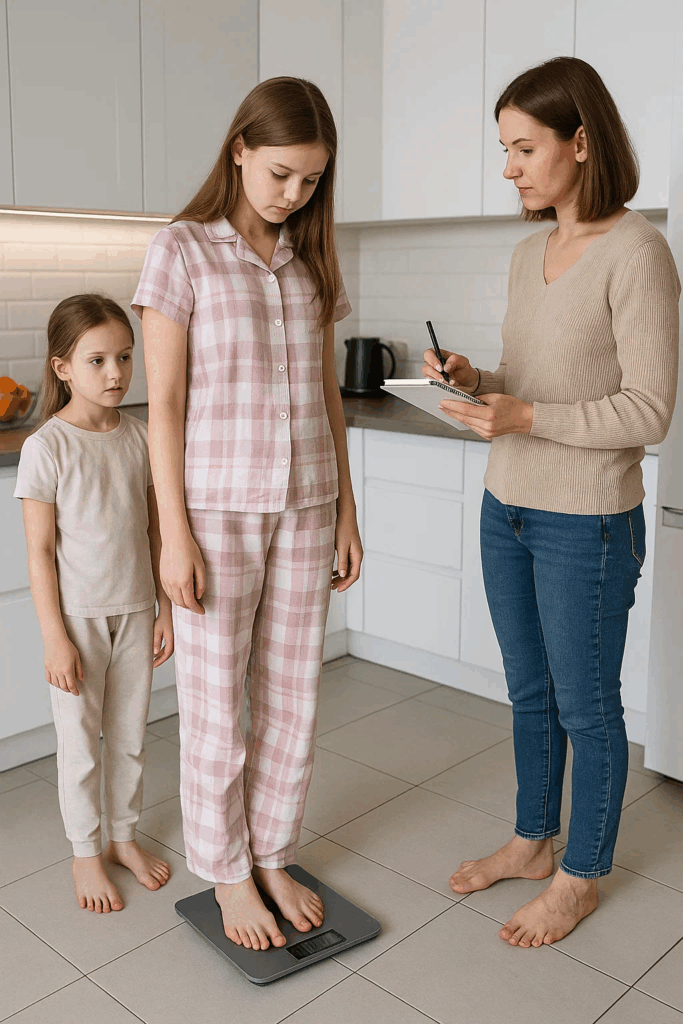To my mother, love was never unconditional—it was measured, weighed, and priced according to the numbers flashing back on a bathroom scale.
I always wanted to be the kind of girl who didn’t crave anyone’s approval, but I wasn’t. I desperately wanted hers. While Khloe shrank into nothingness, I tried to earn Mom’s affection by excelling at everything else. I polished the house until it gleamed, collected perfect grades, and took home every science fair ribbon I could win. None of it mattered. She’d wave a dismissive hand at my trophies and sneer, “Imagine if you put all that effort into something useful—like fixing your diet.”
Somewhere deep down, I knew it was warped. But whenever I confided in aunts, uncles, or cousins, they brushed me off. “Your mother looks amazing for her age,” they’d say. “You should really listen to her.” Slowly, I started believing them. I told myself our life was normal.
That illusion shattered when I was 13. I came home to find Khloe crumpled on the hallway floor, an empty bottle of Mom’s diet pills beside her. My hands shook as I dialed 911, sobbing through every word. I rolled her onto her side, fumbling through what little I remembered from health class. Her lips were bluish when she whispered, barely audible: “I just wanted to lose five more pounds for Mom’s birthday.”
Later, hooked up to tubes in a hospital bed, her first question was, “Do I look thinner?” That was the day I realized my sister was gone—not just to the pills, but to our mother’s obsession.
After Khloe’s overdose, survival meant following the rules. I skipped meals until the hollow ache felt familiar. I sucked in my stomach whenever Mom was nearby, bracing for her judgment. Our house became sterile and cold, a stage where we performed instead of lived.

When I was 15, Dad finally came back. For most of my childhood, he’d been overseas, just a voice on the phone. But once he saw what our lives had become, he moved fast. He filed for divorce and fought for custody. Mom clawed back viciously, but medical records—Khloe’s malnutrition, my own health notes—said more than words ever could.
I moved in with Dad. Slowly, I relearned how to eat. Food wasn’t punishment or reward anymore—it was simply food. Khloe, when given a choice, stayed with Mom. Her loyalty—shaped by fear—still chained her there.
By senior year, I was strong. I joined the volleyball team, ate pizza with my friends, and didn’t feel guilty afterward. I was finally free.
At 18, I hadn’t seen Mom or Khloe in three years. Dad gently asked if I’d consider visiting them for my birthday. Against my better judgment, I agreed. I wore loose clothes, steeling myself for the comments. But when the door opened, I was not ready.
Khloe stood there like a shadow of herself. Her bones jutted sharply, her skin papery, her hair thin as threads. “Khloe… oh my god,” I whispered. “What happened to you?”
She cut me off, brittle and sharp: “You’ve gotten huge.”
It felt like my chest cracked open. Before I could speak, Mom appeared, her eyes crawling over me with disgust. “What did you do to yourself?” she shrieked, clawing at my stomach. “You were finally making progress—and now look at you. You’re disgusting.”
I tried to leave, but Mom blocked the doorway. “You’re not leaving until you drink this,” she hissed, shoving an old meal replacement shake at me. “Two hundred calories. You need to get back on track.”
I refused. The bottle was ancient, its label yellowed. She lunged, trying to force it on me. The rancid stench hit first—spoiled and sour. I screamed for her to stop, but she barked at Khloe, who grabbed my arms with terrifying strength. As I thrashed, Mom pushed the foul liquid against my face, chanting, “This is for your own good!”
I tore free, bolted to the bathroom, vomited, and locked the door with shaking hands. I called Dad. Through the door, I heard Mom shrieking—accusing me of choosing ugliness, of rejecting everything she had taught me.
Dad phoned the police and rushed over. When officers arrived, they took one look at Khloe’s skeletal frame and called paramedics. As they lifted her onto a stretcher, she gripped my hand, whispering, “She made me take laxatives this morning too.”
Outside, Mom screamed for the neighbors, insisting on her rights. I climbed into the ambulance with Khloe. An EMT checked her vitals, his face grim. “Seventy-eight pounds,” he muttered, shaking his head.
At the hospital, chaos erupted. Mom stormed in waving papers. “I have medical authority! I decide everything!”
But Dad appeared with his own documents. “No, Diane. Judge Martinez signed an emergency change this morning.” Mom’s face drained, then twisted with rage.
As Khloe was rushed inside, a social worker named Sarah intercepted me. “You’re the sister who called 911?” she asked. “Why didn’t you reach out sooner? Why did you abandon her?”
Her words pierced me. Before I could answer, Mom swooped in: “She left us! She chose her father and forgot her sick sister. She’s only here for attention.” I noticed the intake nurse typing: Sister has anger issues, per mother. Mom was already twisting the narrative.
Through the glass, Khloe’s monitor blared as her heart faltered. Doctors swarmed. Dad’s lawyer whispered, “She’s been recording you.” Sure enough, Mom pulled out a clip: “…hate you enough to hurt you…” ripped from context.
Her lies spread fast. Old texts, social posts—she twisted everything. Soon, I was barred from visiting Khloe. Even my college placed me on probation. Dad’s clients began backing away. Her poison reached everywhere.
Desperate, I turned to Anne, Mom’s estranged sister. Over video chat, she revealed their childhood—diet pills, brutal competitions, conditional love. “She learned it all from our mother,” Anne said quietly.
I tried to collect proof, recording Mom outside the hospital. But she spotted my phone and flipped the scene—clutching her chest, sobbing, accusing me of harassment. Bystanders filmed. Hours later, a restraining order landed on my doorstep.
Hope flickered when Sarah contacted me privately. She slid a folder across the table. “I shouldn’t show you this, but something’s off.” Inside were multiple intake forms, all signed by Mom, each with different details—different weights, different histories. “She’s gaming the system,” Sarah explained. Receipts also showed lavish “gifts” she’d given staff.
That night, I found our old shared email account. In the drafts was a note from Khloe: I know you’re trying to help. You saved me once. Mom says they’re vitamins, but they make me sick. Please don’t stop. Seconds later, I was logged out. Password changed. Mom had found it.
Then a nurse named Jake reached out. He showed me photos of Khloe’s medication chart—dangerously high doses. He’d seen Mom slipping crushed pills into her drinks. “She’s planning to transfer her to some ‘clinic’ in Arizona,” he whispered. The address he gave me? An empty patch of desert.
At the emergency hearing, it looked hopeless. The judge leaned heavily on Mom’s doctored evidence. The gavel was about to drop when Sarah burst into the courtroom with hospital security footage. It showed Mom, at night, crushing pills into Khloe’s feeding tube.
The room exploded. Mom screamed, “I’m saving her! She’ll blow up without them!”
The judge’s voice was ice. “Bailiff—take her into custody.”
The restraining order vanished. Dad won emergency custody. Doctors confirmed Mom’s “vitamins” were banned stimulants, diuretics, laxatives.
Police raided her house. They found stashes of expired diet pills hidden in every corner. Her supporters vanished. Her lawyer quit. Months later, she pled guilty to child endangerment and assault. Minimum eight years. No trial.
We didn’t attend sentencing. Instead, Dad and I sat with Khloe, playing board games. On the news, Mom’s statement played. Cold. Unapologetic. She insisted she was saving us.
Recovery is messy. Khloe has good days and bad. Sometimes she eats without hesitation. Other times, Mom’s voice still echoes in her head. Dad and I are in therapy too, unpacking our own wounds.
Three months into treatment, in a family session, Khloe looked at me. Her eyes were clear, her voice steady. “I knew the pills were killing me,” she said. “But I kept taking them. Because at least when I was dying… she noticed me.”
We cried for the children we once were, for the sister I nearly lost, and for the long fight ahead. The war with our mother was finally over. But the battle to reclaim ourselves was just beginning.


